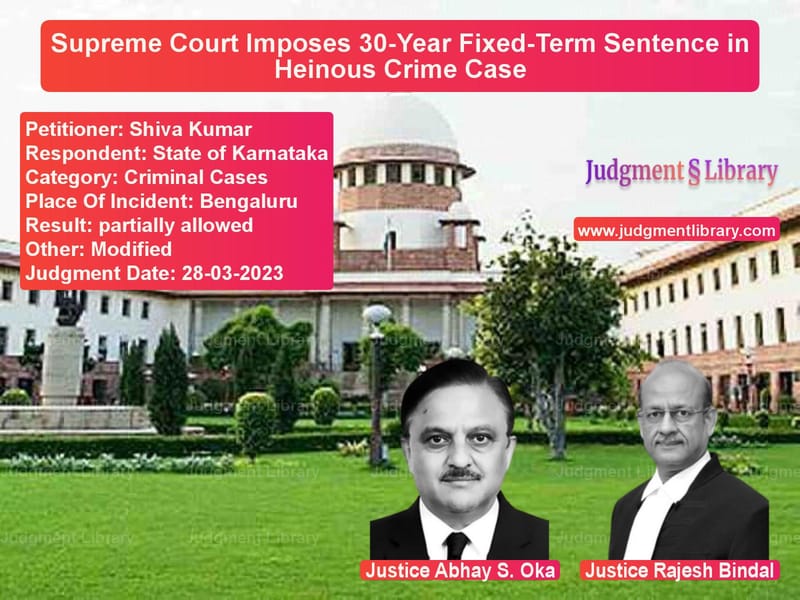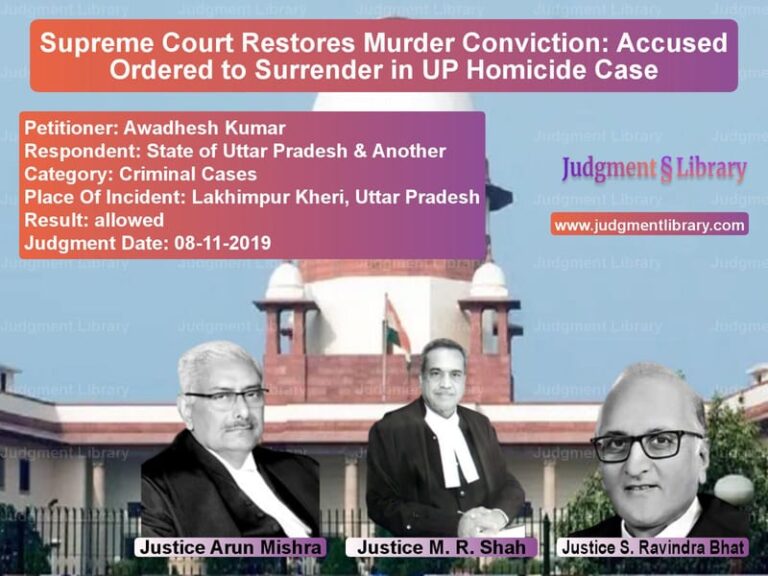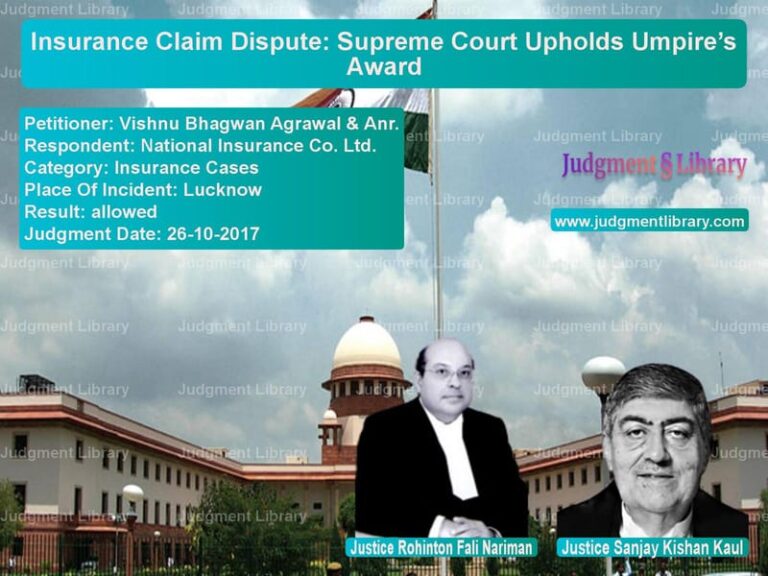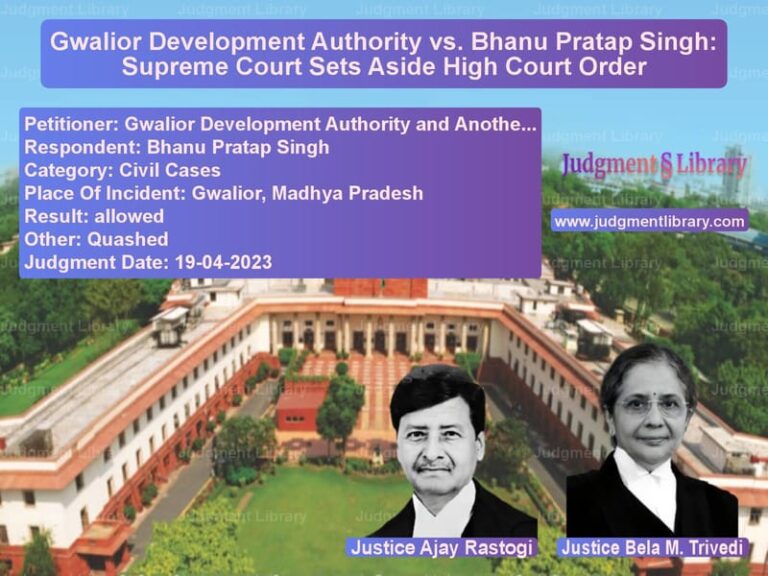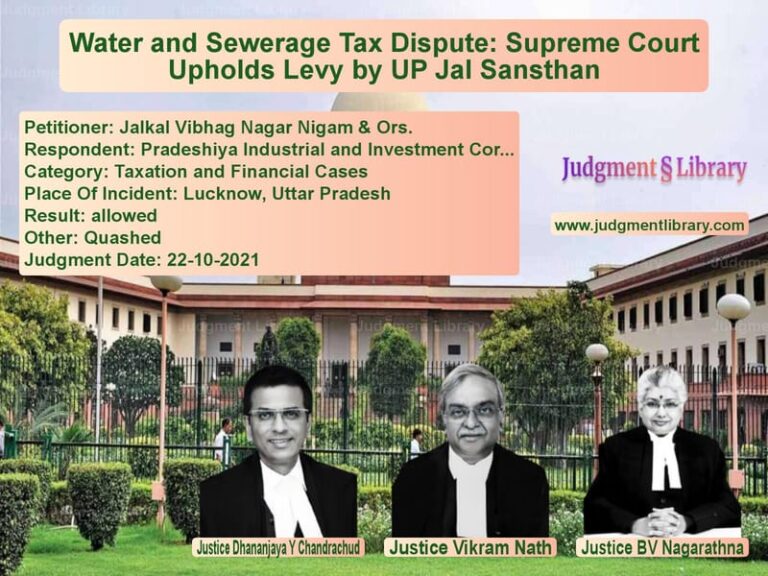Supreme Court Imposes 30-Year Fixed-Term Sentence in Heinous Crime Case
The Supreme Court of India, in the case of Shiva Kumar v. State of Karnataka, upheld the conviction of the appellant under Sections 366, 376, and 302 of the Indian Penal Code (IPC) but modified the life sentence to a fixed-term sentence of 30 years. The judgment, delivered by a Bench comprising Justices Abhay S. Oka and Rajesh Bindal, emphasizes the judiciary’s responsibility in balancing the gravity of the offense with the accused’s potential for reformation.
Background of the Case
The case pertains to a brutal crime committed by Shiva Kumar, who was convicted for kidnapping, raping, and murdering a 28-year-old woman in Bengaluru. The victim was an employee of an IT company, and on the fateful night, she was misled by the accused into boarding his vehicle, which was not designated for her usual route. Subsequently, she was raped and murdered, and her body was later recovered.
The Sessions Court sentenced the accused to life imprisonment without remission. The High Court upheld this decision. The matter was brought before the Supreme Court, where the primary issue was whether the Trial Court could impose such a modified sentence without commuting the death penalty.
Read also: https://judgmentlibrary.com/supreme-court-acquits-accused-in-murder-case-due-to-lack-of-evidence/
Arguments by the Parties
Arguments by the Appellant (Shiva Kumar)
- The Trial Court exceeded its authority by imposing a life sentence without remission.
- Only Constitutional Courts (High Court and Supreme Court) can impose modified sentences.
- The accused had no prior criminal record and had shown good conduct in jail, even completing his B.A. degree.
- Considering his young age at the time of the offense and his familial responsibilities, a lesser sentence should be considered.
Arguments by the Respondent (State of Karnataka)
- The crime was premeditated and extremely heinous, justifying the imposition of the most stringent punishment.
- Courts are not restricted from imposing fixed-term sentences in cases that do not qualify for the death penalty.
- Reducing the sentence would undermine the confidence of the public in the judiciary.
Supreme Court’s Observations
Clarification on Fixed-Term Sentences
The Supreme Court relied on the precedents set in V. Sriharan v. Union of India and Swamy Shraddananda v. State of Karnataka, which establish that modified sentences, including fixed-term life imprisonment, can be imposed by Constitutional Courts.
“Even in cases where capital punishment is not imposed, Constitutional Courts can exercise their power to direct that a life sentence shall be for a fixed term exceeding fourteen years.”
Nature of the Offense
The Court observed that the victim, a working woman contributing to India’s IT sector, was misled by the accused into boarding his vehicle. The crime was committed in a manner that shook the conscience of society.
“The brutal killing of a woman who trusted her workplace’s transport system requires an exemplary punishment to reinforce public confidence in the justice system.”
Rights of the Victim and Society
The Court highlighted that the rights of the victim and society must also be considered when determining sentences. A lenient approach would send the wrong message, especially in cases involving crimes against women.
“The balance of aggravating and mitigating circumstances must ensure that justice is done not just for the accused but also for the victim.”
Final Judgment
The Supreme Court modified the sentence as follows:
- The accused shall undergo life imprisonment.
- However, he shall serve a minimum of 30 years in prison without the possibility of remission.
- The appeal was partly allowed to this extent.
Impact of the Judgment
- Clarifies Sentencing Powers: The ruling reaffirms the judiciary’s power to impose fixed-term life imprisonment beyond 14 years.
- Sets Precedent for Heinous Crimes: This judgment will be referenced in future cases involving brutal crimes against women.
- Ensures Victim-Centric Justice: The decision underscores the importance of considering the victim’s rights when determining appropriate punishment.
Conclusion
The Supreme Court’s judgment in Shiva Kumar v. State of Karnataka is a landmark ruling that reinforces the judiciary’s role in ensuring proportional punishment for heinous crimes. By imposing a fixed-term life sentence of 30 years, the Court struck a balance between reformation and deterrence, setting a strong precedent for future cases involving similar offenses.
Petitioner Name: Shiva Kumar.Respondent Name: State of Karnataka.Judgment By: Justice Abhay S. Oka, Justice Rajesh Bindal.Place Of Incident: Bengaluru.Judgment Date: 28-03-2023.
Don’t miss out on the full details! Download the complete judgment in PDF format below and gain valuable insights instantly!
Download Judgment: shiva-kumar-vs-state-of-karnataka-supreme-court-of-india-judgment-dated-28-03-2023.pdf
Directly Download Judgment: Directly download this Judgment
See all petitions in Bail and Anticipatory Bail
See all petitions in Murder Cases
See all petitions in Extortion and Blackmail
See all petitions in Fraud and Forgery
See all petitions in Judgment by Abhay S. Oka
See all petitions in Judgment by Rajesh Bindal
See all petitions in partially allowed
See all petitions in Modified
See all petitions in supreme court of India judgments March 2023
See all petitions in 2023 judgments
See all posts in Criminal Cases Category
See all allowed petitions in Criminal Cases Category
See all Dismissed petitions in Criminal Cases Category
See all partially allowed petitions in Criminal Cases Category

